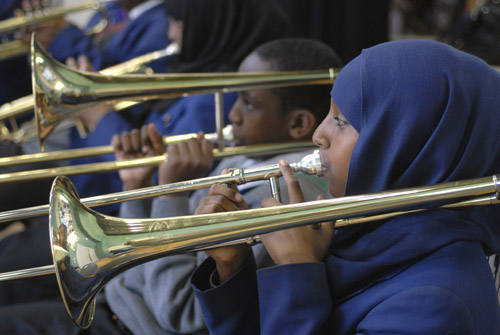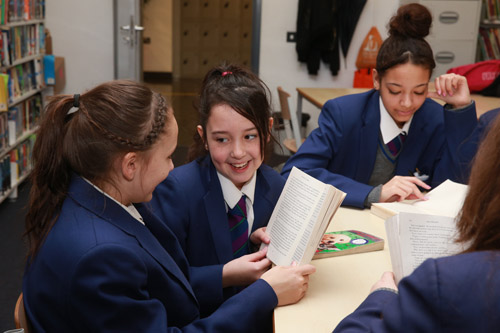We have high expectations for all our pupils and ensure that every learner is challenged and supported to reach their full potential.
Drama Curriculum
Drama is an artistic, practical and intellectual subject represented by performance. The term is derived from a greek word meaning “action”.
Drama enables the development of various skills and attributes, for example improvisation, interpretation, creativity, collaboration, performance, self-confidence, communication, evaluation and analysis.
Key Stage 3 Drama
The curriculum follows the Key Stage 3 National Strategy: Drama Objective Bank. It takes into account the three modes of activity:
- Making (or creating)
- Performing
- Responding
Broad topics include:
- Health and Safety
- Role play – Developing confidence, putting yourself in other peoples shoes
- Sustaining a role or roles using performance styles
- Interpreting a role in a coherent way
- Developing a character
- Communicating with an audience
- Creating atmosphere (using sound)
- Developing Physical and Vocal Skills
- Gestures
- Movement
- Use of space
- Timing: Speaking and Listening appropriately
- Levels/Tension/Atmosphere
- Reading play scripts: Development of Critical Thinking through the understanding of text, sub-text, plot, themes, monologue, dialogue, scene structure and stage directions
- Writing short play scripts from improvisation work: Character, Setting, Plot
- Drama Techniques/Strategies – Still Image or Freeze frame, Thought Tracking, Narration
- Working cooperatively with others in groups: expressing yourself in an active and exciting way, contributing ideas and respecting others
- Analysis and Evaluation through Self and Peer Assessments
Stimuli include the use of: poetry, artefacts, music, play scripts, television, films, video/DVD, news and/or magazine articles and extracts from literary fiction or non-fiction.
Key Stage 4 Drama
The curriculum follows the Edexcel syllabus specification. The curriculum also references work done in Key Stage 3 above.
Broad topics
Broad topics include:
Practical exploration of change, chance, loss, wars, peace, celebrations, journeys and also involves annotating a play script, role-on-the-wall, writing monologues and dialogues.
Explorative strategies
This experience should help pupils gain a depth and breadth of understanding of the topic, theme or issue. Pupils should be able to evaluate how the strategies helped them gain greater insight into their enquiry.
Examples of explorative strategies are:
- Still image
- Thought-tracking
- Narrating
- Hot-seating
- Role play
- Cross-cutting (movement, mime, space, levels)
- Forum theatre
- Marking the moment
Drama medium
This will help pupils develop their explorations and give them the opportunity to see how the application of the drama medium can enhance the communication of the meaning of the topic, theme or issue when recreated in drama form.
Examples of the use of the drama medium are:
- Costume
- Make up and/or masks
- Lighting
- Sound
- Space and/or levels
- Set and/or props
- Movement, mime and gesture
- Voice
- Spoken language
Elements of drama
Pupils should be able to recognise the elements of drama within their work and better understand how these can assist and clarify dramatic form.
Examples of drama elements:
- Action/plot/content
- Forms
- Climax/anti-climax
- Rhythm/pace/tempo
- Contrasts/similarities
- Characterisation
- Conventions
- Symbols
The forms of stimuli used include:
- Poetry
- Artefacts
- Music
- Play scripts
- Live theatre performance
- Television, films, video/DVD
- News and/or magazine articles
- Extracts from literary fiction or non-fiction
The curriculum follows the Edexcel examination board. There are three units:
Unit 1
Practical exploration of the following:
- Forms of stimuli
- Explorative strategies
- Drama medium
- Elements of drama
Unit 2
Exploring play texts:
- Exploration of a character
- Interpretation of the play
- Design implication for the play
- Review of a live theatre performance
Unit 3
Drama performance: Acting skills – pupils rehearse and perform a devised/scripted play performed to an audience including a visiting examiner.
Programme of study
The following explorative strategies help to deepen pupils’ understanding of ideas, character, scene structure and dramatic significance.
- Still image
- Thought-tracking
- Narrating
- Hot-seating
- Role play
- Cross-cutting
- Forum theatre
- Marking the moment
The following elements of drama introduce pupils to the grammar of drama, the underpinning structure of drama, forms of drama and methods of dramatic communication.
- Action/plot/content
- Forms
- Climax/anti-climax
- Rhythm/pace/tempo
- Contrasts/similarities
- Characterisation
- Conventions
- Symbols
The following drama medium introduces pupils to design forms of drama and how design can support communication of meaning in drama. The medium also introduces pupils to the physical nature of drama and the essential acting techniques.
- Costume
- Make up and/or masks
- Lighting
- Sound
- Space and/or levels
- Set and/or props
The forms of stimuli used include:
- Poetry
- Artefacts
- Music
- Play scripts
- Live theatre performance
- Television, films, video/DVD
- News and/or magazine articles
- Extracts from literary fiction or non-fiction




